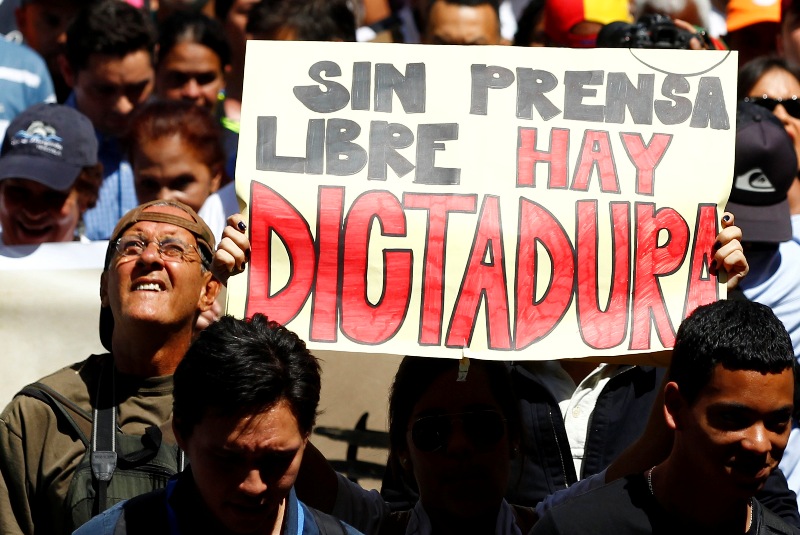On Feb. 11, more than 1,000 journalists and supporters marched from Plaza Venezuela to the offices of the Centro Nacional de Comercio Exterior (CADAVI), the commission responsible for administering the currency in Venezuela, in a protest organised by journalist associations to demand access to newsprint.
Carlos Correa, executive director for Espacio Público (Public Space), a Venezuelan human rights and press freedom watchdog, told IPI that the paper shortage is generated by the failure of the government to provide the necessary foreign currency (US dollars) that would allow newspaper companies to buy newsprint. Oswaldo Cali, another spokesman for Espacio Público, added that “the lack of currency is an issue that is affecting only media which are independent and critical of government policies.”
Out of 136 printed publications in Venezuela, only 20 have the possibility to import paper directly, Correa explained to IPI.
“It is the responsibility of the state to ensure that the conditions exist for journalists and media outlets to inform the people about issues of public interest,” IPI Press Freedom Manager Barbara Trionfi said. “We are extremely concerned about reports that the paper shortage has affected critical news outlets more than those perceived as government friendly.”
According to Lorena Gil, reporter for Venezuela’s national daily El Nacional, one of the country’s largest newspapers, their publication has been forced to reduce their daily printed edition from four to two sections and their Sunday edition from six or seven sections to two. Gil told IPI that El Nacional may decrease their printed edition to only one section by midyear if changes regarding the access to paper are not made soon.
At the same time, the Venezuelan daily El Impulso, from the western state of Lara, reduced its press run from 16 to 12 pages due to the lack of paper, according to a report published on Feb. 8. by the Instituto Prensa y Sociedad de Venezuela (Press and Society Institute or IPYS-Venezuela), a Caracas-based press freedom group.
El Nacional reported this week that the Venezuelan government has provided paper to only 45 regional newspapers.
Just this week, Notidiario published its last print edition, becoming the sixth newspaper in the country to stop printing their publication due to the shortage of paper in the country. The other five newspapers that ended their printed editions are: Antorcha, El Expreso, El Guayanés, El Sol de Maturín, and Diario de Sucre.
Besides restrictions on newsprint, there have been other recent moves against the media in Venezuela.
Several reporters have been harassed and even taken into custody while covering demonstrations in Caracas over the past week, according to reports from various news organisations.
Just this week, two photojournalists were taken into custody in Caracas after attempting to cover a protest march led by university students and opposition parties. Photojournalist Rafel Hernández and Ángel Matute were arrested on Feb. 12 and Feb 13 respectively. As of today, only Hernández had been released.
Ángel Matute’s aunt, Ana Maria Matute, a reporter for El Nacional, told IPI that Matute has not been allowed to speak to anyone while under custody at National Guard operational headquarters located in Tazón. Ana Maria Matute said that her nephew was beaten by a government group and subsequently taken into custody by the military.
Colombian-owned news channel NTN24, reporting from Venezuela, published a press release on their website on Feb. 12, in which they explained their signal was temporarily taken off the air by CONATEL, the government agency in charge of regulating broadcast media in Venezuela.
In a statement released today, the UN High Commission for Human Rights expressed its concern with the growing attacks on the press in Venezuela. The commission spokesperson, Rupert Colville, said they received “worrying reports of intimidation of journalists, some of whom have had their equipment seized, as well as reports that some local and international journalists were attacked while covering the protests.”



